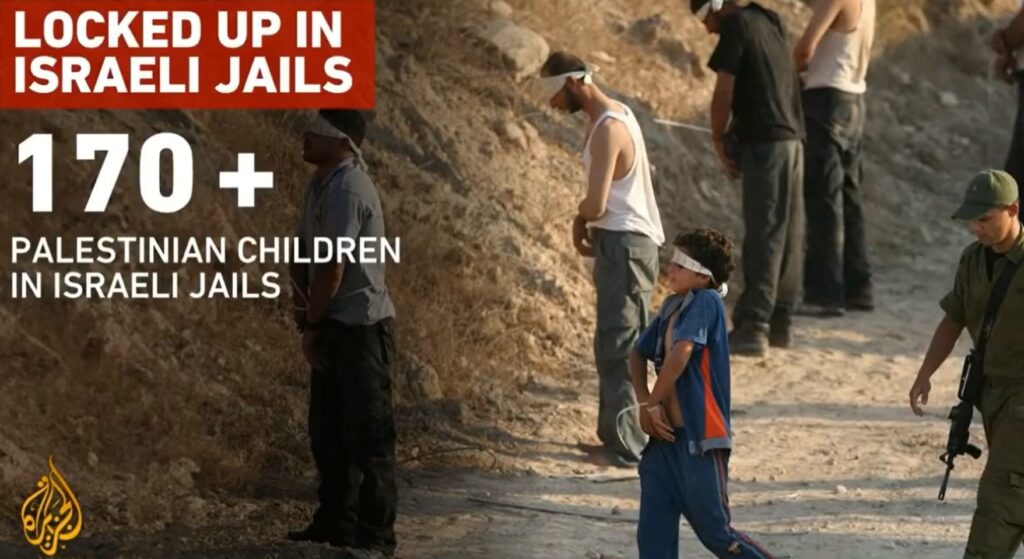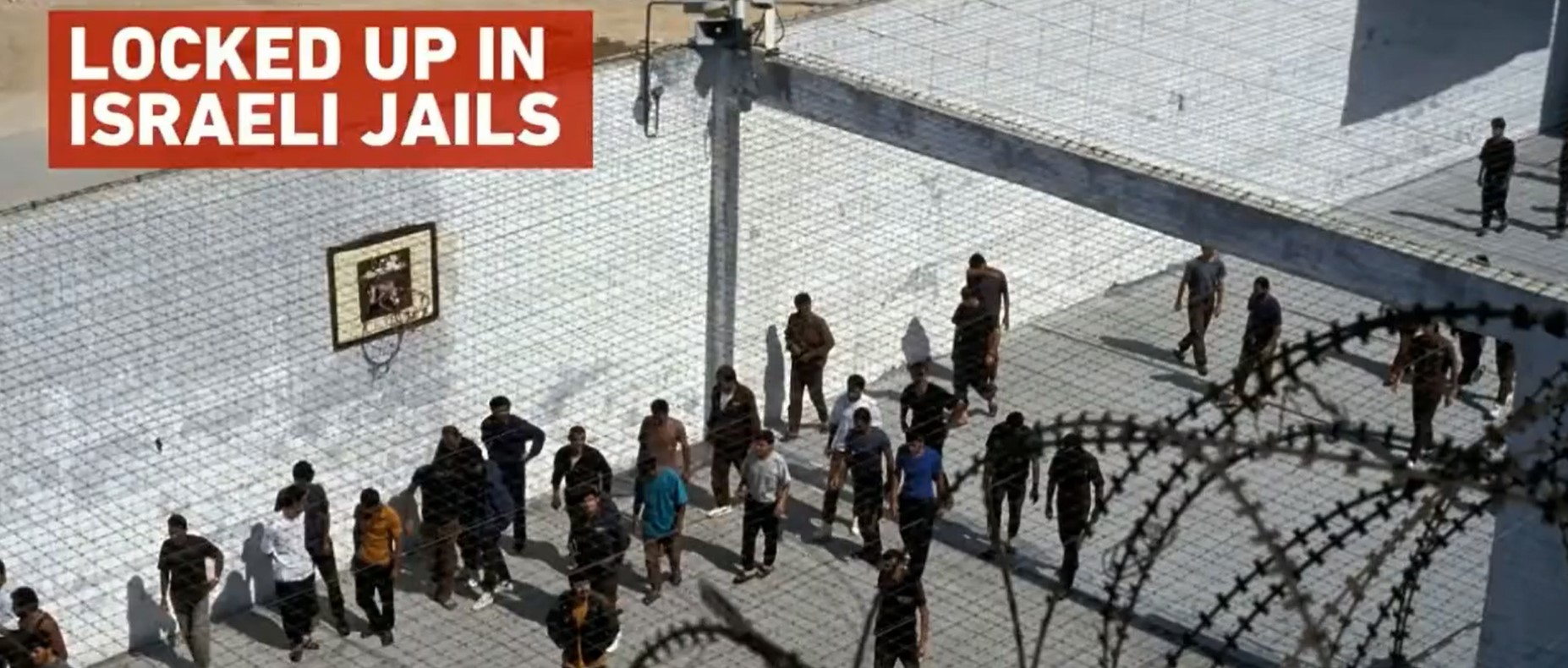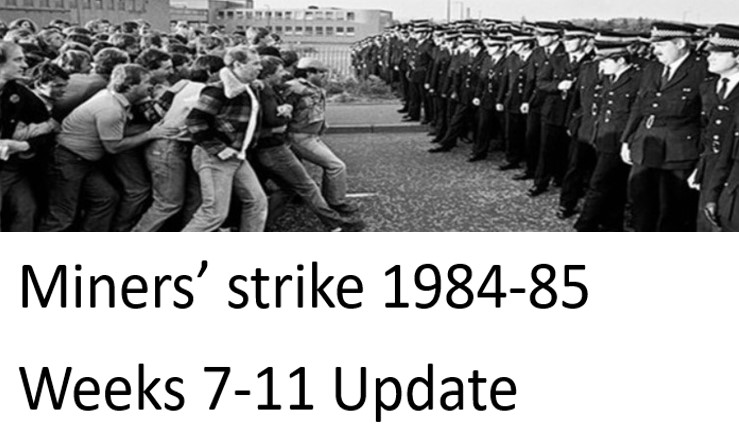The Western mainstream media has give widespread publicity to the Israeli and international hostages taken by Hamas on October 7 then subsequently released in the exchanges for Palestinian prisoners. There is been very little publicity, on the other hand, given to the Palestinian prisoners – some would say ‘hostages’ – released by Israel.
Nor is there much publicity about the fact that Israel is constantly ‘replenishing’ its supply of Palestinian prisoners by mass arrests in the West Bank, holding them without trial or any due process of law. According to UN data (Guardian, November 29) one in five Palestinians in the West Bank spends time in an Israeli jail at one time or another in their lives, some after ‘military trials’ which have a 98% conviction rate.
Before the prisoner swaps began, the Palestinian Prisoners Society reported that 7,200 prisoners were held by Israel, including 88 women and 250 children. Many are held in ‘administrative detention’ which is imprisonment without trial. Since October 7, Israel has detained an additional 3,260 Palestinians, including 120 women and more than 200 children. This is ten times the number of prisoners released as a result of the week-long cease-fire with Hamas.
The conditions faced by Palestinian internees in Israel have been summarised in this excellent article, which we have republished fromthe French news website, MediaPart, and written by Alice Froussard.
……………………………………………..
“We were no longer treated as human beings”
During the seven-day truce that ended Friday morning, Palestinian prisoners were released by Israel. All of them describe detention conditions that have deteriorated even more than usual. Since 7 October, at least six Palestinians have died in detention.
The International Committee of the Red Cross (ICRC) bus struggles to make its way through the crowds. Fireworks explode, honks blare, there is a sea of flags and residents waving their fingers at victory as the 33 Palestinian prisoners who are now free approach.
On Monday night, the fourth day of the truce between Israel and Hamas, a break that was shattered on Friday morning, there were scenes of jubilation and emulation similar to previous days in front of Ramallah City Hall. As they get off the bus, the ex-detainees smile and hug their families. All are celebrated as heroes, carried on the shoulders of their comrades.
Suddenly, one of the young people falls under the frightened cries of his relatives, who is rescued at the last minute by rescue workers from the Palestinian Red Crescent. He is physically unable to cope and has just fainted. “Water, bring him water!”chants his mother next to him. Other prisoners have tired faces and frail complexions. Mohammad Nazzal, from the village of Qabatiyeh, near Jenin, has his arm in a sling.
“It was the guards who did this to me. They beat me a week ago and since then I can’t move my arm. In prison, I was screaming in pain and just before my release, I was beaten again. I had no access to anything, no care,” said the 17-year-old, adding that the Red Cross provided him with the bandages when he was released from prison. Two fingers on his right hand are broken, his left arm is broken, and his back is covered in bruises.
Mohammad says he is not alone. “There is torture in prison. We heard screams all the time,” he continues. Some prisoners were losing consciousness. I saw older prisoners crying from the pain, others with their faces covered in blood. These scenes will stay with me forever, I can’t seem to forget them”.
Like him, all the released prisoners describe conditions of detention that have deteriorated even more than usual. “After October 7, our ways of life changed completely,” Shrouq Dwayyat said from the living room of his family’s home in Jerusalem, the day after his release from prison.
She assures him that women are not spared. The 26-year-old ex-convict recounts reduced food, overcrowding per cell, outings only to take showers, family visits cancelled, calls with lawyers as well. “We didn’t have a radio either, we were totally cut off from the outside world.”
The majority of their clothes were confiscated, all household appliances – hobs, kettles – and it was no longer possible to buy hygiene products. “Above all, the guards raided our cells every day, threw tear gas canisters at our feet, beat us and didn’t take into account our need for privacy as women. It was unprecedented repression and we were no longer treated as human beings. They want to humiliate us”.
According to an Amnesty International report published on 8 November, testimonies and videos document “numerous cases of deliberate torture, beatings and humiliation by the Israeli authorities” andsince 7 October, at least six Palestinians have died in detention.
This is the case of Omar Daraghmeh. The 58-year-old Hamas member was arrested on October 9 at his home in Tubas, in the northern West Bank, and placed in administrative detention, meaning he was held without charge or trial, under the idea that he could be “a future threat to Israel’s security.”
On 23 October, authorities at Meggido prison announced his death “after feeling unwell and going to the prison clinic for tests”.
According to the medical report published by the prison administration, Omar Daraghmeh was suffering from internal bleeding, particularly in the stomach and intestines. The circumstances are unclear, but his family sees it as the result of beatings.
“Omar didn’t have any particular health problems,” sighs his son, Nimr, who says that two hours before he died, his father had told his lawyer that everything was fine. “Already, when they arrested him, my father had been forcefully pushed against the walls, against the furniture, under the pretext that the soldiers wanted to subdue him. He had been severely beaten”.

The next day, Arafat Hamdan, another detainee from Beit Sira, died in Ofer prison, two days after his arrest. He was 25 years old, had a six-month-old daughter, and his wife was pregnant. “Arafat was diabetic, he was extremely careful about what he ate,” says Mahmoud, his cousin. “But we have been in contact with other detainees who have told us that prisoners are severely beaten before their trial or when they have to go to the clinic. Apparently, he also did not have access to his medication”.
“It’s not even medical negligence anymore, it’s a total interruption of medical treatment,” said Amani Sarhani, a spokeswoman for the Palestinian Prisoners’ Club. Mediapart contacted the prison authorities to find out the circumstances of the inmates’ deaths but did not receive a response.
“I didn’t recognize him at first”
But the abuse did not begin after the Hamas attack last October. From her apartment in Al-Bireh, near Ramallah, Rinad Zaurob recounts her husband’s last arrest, in September 2019 – the eighth of his life – and the torture he suffered.
In all, L’tiraf al-Rimawi, director of the Edward Said Conservatory of Music in Ramallah, has spent more than 10 years behind bars, half of them in administrative detention, accused by Israel of being an active member of the armed wing of the Popular Front for the Liberation of Palestine (PFLP), an organization classified as terrorist by Israel, the United States and the European Union – something he and his family have always denied. “As evidence, the authorities took documents from his student years. But there’s nothing at all: it’s just baseless accusations,” says Rinad.
At that time, her husband spent a month in Ofer prison, and then Rinad was informed – on October 23 – that he had been transferred to Jerusalem to the Mascobiyeh, an interrogation and detention center infamous for its torture of Palestinians, so much so that they nicknamed it “The Slaughterhouse.”
She has not heard from him and visits are forbidden. Twenty-nine days after his transfer, only the ICRC was allowed to see L’tiraf. “But they refused to give me any information, they just told me he was fine, without details. On their second visit, they told me that my husband was “doing better.” What do you mean, “he’s getting better”? What happened to him? What does it mean “good or better” according to them? I was completely freaked out”. She tried to get details and went to the ICRC headquarters, but to no avail. Her husband will remain in the interrogation centre for 57 days.
When Rinad was finally able to see him again – two minutes before a “confidential” hearing at the military court that she was unable to attend – the lawyers advised her to “prepare herself psychologically“. “It was a huge shock”, despite their warning. “I didn’t recognize him at first,” she says.
She recounts his radically changed features: the long beard giving him the impression of [being] a few years older, his long hair, his thinness and his sudden convulsions.“He was extremely pale and could not stand: his feet and hands were swollen, bruised, and I could not see the rest of his body because of the prison clothes. I found out much later that the chair where my husband was sitting that day was a wheelchair, that he had fainted several times and had major problems with his blood circulation. There was no doubt that L’tiraf had been subjected to physical and psychological torture.”
Today, she only knows what happened thanks to lawyers from Addameer, an organization that defends the rights of Palestinian prisoners. “They told me that L’tiraf was blindfolded most of the time and that the authorities beat him [about] the head. He was held in awkward positions for hours and forced to stand against a rough surface, with the interrogator pressing down on his shoulders to make the pain greater.”
Systemic violence
According to the Rome Statute of the International Criminal Court, torture or inhuman treatment is a war crime, particularly when it is committed in armed conflict and when it is committed against a population under occupation which, according to international humanitarian law, should be protected by the occupying power.
Since 1999, the Israeli Supreme Court has affirmed that “torture is absolutely prohibited in Israel”, as the state is a signatory to the Convention against Torture. “But the same Supreme Court also clarifies that if a member of a security agency uses extreme interrogation techniques – bordering on torture – then he will be exempted if he explains that there was a ‘necessity’ and that he had to do it in order to ‘save lives’. It’s really unique here: no other legal system in a democracy has made this legal. As a result, what was supposed to be a law allowing exceptions became the one that set the standard,” says Tal Steiner, executive director of the Public Committee Against Torture in Israel (PCATI).
Every year, the organization documents dozens of serious cases of physical and psychological torture against Palestinians detained in Israel: according to figures from early 2023, 1,400 complaints have been filed in the past two decades. But only three have led to investigations and none have led to trials or convictions, “despite the clear evidence,” Steiner said. “Above all, these are not isolated incidents, they are part of the Israeli system.”
The original article on the MediaPart website can be found here. Pictures from Al Jazeera X-feed here.



